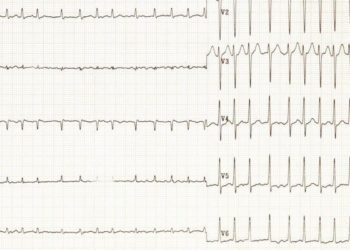Ambulances equipped for thrombolysis allow for more rapid stroke treatment
Image: PD
1. Ambulances equipped to give tissue plasminogen activator (tPA) for ischemic stroke allowed for more rapid treatment and increased rates of treatment.
2. Seven-day mortality in individuals given tPA on ambulances was no different when compared to those treated with tPA in the hospital.
Evidence Rating Level: 2 (Good)
Study Rundown: There is a constant effort to create systems in which individuals with strokes can be treated as safely and quickly as possible. This study implemented a system involving ambulances prepared to diagnose and treat ischemic strokes quickly. Each of these ambulances had a neurologist, a paramedic, and a radiology technician on board. The ambulance was equipped with a CT scanner and the ability to perform basic laboratory tests such as a complete blood count, INR, and glucose level. There was a neuroradiologist on call to confirm suspicion of stroke and indication for tissue plasminogen activator (tPA). This study showed that such a system leads to more rapid treatment with tPA after ischemic stroke and increases thrombolysis rates overall. There was no overall difference in in-hospital mortality between patients treated with usual care and the intervention. Strengths of this study include the relatively large number of patients included and the thorough criteria used to determine if an individual was a candidate for tPA. However, this may not be generalizable because such an intervention would require a great deal of resources that may not be available in all locations. While a system like this may be helpful in decreasing time to tPA and increasing tPA rates, more studies on long-term outcomes should be done.
Click to read the study, published today in JAMA
Relevant Reading: Streamlining of prehospital stroke management: the golden hour
In-Depth [randomized controlled trial]: This study introduced ambulances specifically prepared to rapidly diagnose and treat ischemic strokes with tPA. The average time between calling an ambulance and treatment was reduced by 15 minutes (95% CI 11-19) during the intervention weeks and the average time to treatment with tPA was reduced by an additional 25 minutes (95% CI 20-29) in individuals treated on the specialized ambulances. The rate of tPA treatment after stroke was higher when the specialized ambulance was deployed (32.6%) and during intervention weeks (29.0%) than during control weeks (21.1%) (p<0.001 for both). Treatment on the specialized ambulances was not associated with an increased risk of intracerebral hemorrhage (p=0.06) or 7-day mortality (p=0.53).
More from this author: Risk-reduction counseling with HIV testing may not decrease rates of sexually transmitted infections, Autoantibodies may precede symptom onset in Sjögren’s Syndrome, Peer based health education program linked to reduced waist circumference, No overall change in the prevalence of obesity in the United States between 2003 and 2012, Web-based intervention insufficient for reducing drinking among students
©2012-2014 2minutemedicine.com. All rights reserved. No works may be reproduced without expressed written consent from 2minutemedicine.com. Disclaimer: We present factual information directly from peer reviewed medical journals. No post should be construed as medical advice and is not intended as such by the authors, editors, staff or by 2minutemedicine.com. PLEASE SEE A HEALTHCARE PROVIDER IN YOUR AREA IF YOU SEEK MEDICAL ADVICE OF ANY SORT.

![siRNA against antithrombin alleviates symptoms of hemophilia [PreClinical]](https://www.2minutemedicine.com/wp-content/uploads/2015/04/clot-CCWiki-350x250.jpg)







